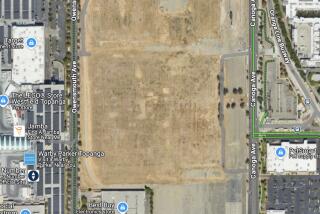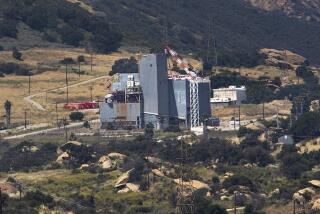Love Canal Homes Attract Dozens of Potential Buyers
- Share via
NIAGARA FALLS, N.Y. — Home-seekers flocked to the neighborhood surrounding the Love Canal toxic-waste dump Wednesday as a state agency put nine houses up for sale but refused to guarantee their safety in writing.
“The area’s been real quiet. It’ll be nice to get neighbors back,” said William Stevenson, one of about 70 people who stayed in the neighborhood rather than accept a government buyout during the late 1970s.
But environmentalists and former neighborhood residents denounced plans to resettle the area, which became a symbol of America’s toxic waste problem when toxic chemical leaks drove about 2,500 people away.
“I think there is a very real risk,” said Rebecca Todd, of the Natural Resources Defense Council.
About 20 people visited the Love Canal Area Revitalization Agency’s sales office and another 10 called in the first four hours it was open, said salesman Len Rinallo. He said two people had already put down $100 deposits on houses they want to buy when the rehabilitation is finished.
The homes are priced at $40,000 to $60,000, about 20% less than comparable homes elsewhere. About 250 houses in the area eventually will be sold.
Love Canal gained notoriety after 22,000 tons of dioxin, PCBs and other hazardous chemicals dumped there 30 years earlier by Hooker Chemical Co. began leaking into a middle-class neighborhood built on top of the dump.
The dump has been capped and a monitoring system installed, but most of the chemicals remain buried beneath a 70-acre fenced-off mound. The area chosen for resettlement is north and northwest of the dump.
State studies show that the area is no more contaminated than comparable neighborhoods elsewhere in Niagara Falls, agency officials said Wednesday.
“It’s probably the safest area in the city of Niagara Falls, because we know the most about it,” agency Executive Director William L. Broderick said.
However, Broderick said the agency could not give any written guarantees that chemical leaks would not reoccur.
“All we have is the written assurance of the state health department, the state environment department,” he said. “If there is a problem in the future, I’m sure the state will come back and do as they did last time.”
Joseph E. Ceretto, a 28-year-old substitute teacher who inspected some of the homes, said the lack of guarantees would not deter him from buying one.
More to Read
Sign up for Essential California
The most important California stories and recommendations in your inbox every morning.
You may occasionally receive promotional content from the Los Angeles Times.













